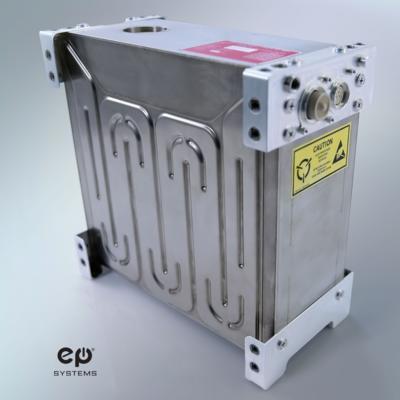Fri, Apr 19, 2024
Usable Battery Pack On the Way for Flight Trainers, Pattern Burners
EP Systems came to AERO 2024 in Friedrichshafen, Germany with their EPiC 2.0 aircraft energy storage system.

The system is said to provide 30 minutes of additional flight time over existing battery packs used in electric aircraft, while requiring no considerable engineering to make the switch. The drop-in system replaces their EPiC 1.0 TSO package, allowing early adopters to stay abreast of modern tech and gain about 50% in endurance.
The EPiC 2.0 module can fast charge in 30 minutes, getting its battery to about 80%. That's great news for those who want to pursue flight training with electric aircraft, and sits closer and closer to the kind of timelines needed in order to have a plane up and running for a short lesson. Now, EP Systems cites a 60-minute endurance for the EPiC 1.0 pack, with 30 minutes of reserve. In the EPiC 2.0 pack? That jumps up to 90 minutes of flight time with 30 minutes of reserve. For those cross-shopping, EP Systems says the EPiC 2.0 pack sports energy density of 265 watt-hours per kilogram, up from its predecessor's 205 wh/kg.

“This really unlocks electrification for so many different customers in so many different segments,” affirmed Nathan Millecam, Chief Executive Officer and Co-Founder of Electric Power Systems. “This is the first time where we've seen the convergence of all the technologies that we've been developing for over a decade now.”
“The average duration of a local training flight is just over an hour. So having one hour plus capacity makes that feasible,” said Dan Sutliff, Assistant Professor at Utah Valley University. “The additional range of these new batteries will allow us to do local flight training and cross-country flight training as well. Everything that needs to be completed for a private pilot certificate.”
The EPiC 2.0 system is in development now, and is scheduled to be available for commercial sale in 2025.
More News
Also: Netherlands Donates 18 F16s, 2 737s Collide On Ramp, E-7 Wedgetail Cut, AgEagle's 100th In S Korea The Pilot and Aircraft Privacy Act was introduced in the House by Represent>[...]
Pilot Also Reported That Due To A Fuel Leak, The Auxiliary Fuel Tanks Were Not Used On June 4, 2025, at 13:41 eastern daylight time, a Piper PA-23, N2109P, was substantially damage>[...]
Have A Story That NEEDS To Be Featured On Aero-News? Here’s How To Submit A Story To Our Team Some of the greatest new stories ANN has ever covered have been submitted by our>[...]
From 2023 (YouTube Edition): Reflections on War’s Collective Lessons and Cyclical Nature The exigencies of war ought be colorblind. Inane social-constructs the likes of racis>[...]
What Goes Around, May Yet Come Back Around, Klyde FMI: www.klydemorris.com>[...]
 Airborne 06.30.25: US v ADS-B Misuse, Natl STOL Fire, Volocopter Resumes
Airborne 06.30.25: US v ADS-B Misuse, Natl STOL Fire, Volocopter Resumes NTSB Prelim: Piper PA-23
NTSB Prelim: Piper PA-23 ANN FAQ: Submit a News Story!
ANN FAQ: Submit a News Story! Classic Aero-TV: One Mans Vietnam
Classic Aero-TV: One Mans Vietnam Klyde Morris (06.30.25)
Klyde Morris (06.30.25)




